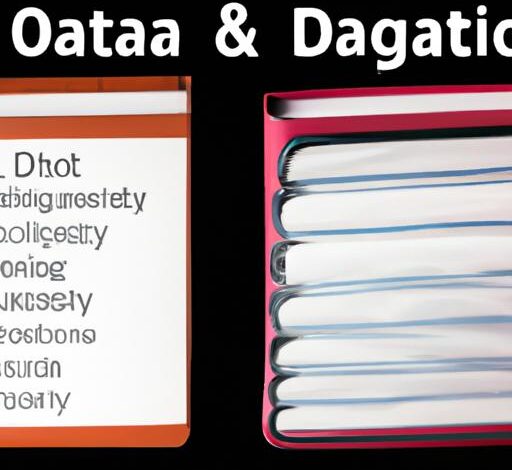Data Catalog vs Data Dictionary: A Comprehensive Guide

Introduction
In the fast-paced digital landscape of today, data reigns supreme. As organizations grapple with vast amounts of information pouring in from various sources, the need for efficient data management tools becomes increasingly apparent. Two key players in the realm of data management are data catalogs and data dictionaries. But what exactly are they, and how do they differ?
Let’s start by understanding the critical role that data management plays in the success of organizations. Data management encompasses the processes, tools, and strategies used to capture, store, organize, and analyze data effectively. At the core of data management are data catalogs and data dictionaries, essential components that help streamline data governance and decision-making processes. So, what exactly are data catalogs and data dictionaries, and how do they contribute to the data management ecosystem? Let’s dive in and explore the nuances of these two powerful tools.
Data Catalog Explained
Definition of Data Catalog
A data catalog is a centralized inventory of metadata that provides a detailed overview of an organization’s data assets. It serves as a comprehensive repository that catalogs and organizes various data sources, making it easier for users to discover, understand, and access relevant data.
Purpose of a Data Catalog in Organizing and Managing Data
The primary purpose of a data catalog is to streamline data discovery and access. By categorizing and organizing data assets in a structured manner, a data catalog helps users locate the information they need efficiently. Moreover, it promotes data governance by enforcing standardized data definitions and ensuring data quality and consistency across the organization.
Features of a Data Catalog
- Metadata Management: Data catalogs store essential metadata such as data source, data lineage, and data quality metrics.
- Search and Discovery Capabilities: Users can easily search for specific data assets using keywords or filters.
- Collaboration Tools: Data catalogs often include features that enable collaboration among data users, fostering knowledge sharing and data-driven decision-making.
Benefits of Using a Data Catalog in Data Management
- Improved Data Accessibility: Data catalogs facilitate quick and easy access to relevant data assets, reducing the time spent searching for information.
- Enhanced Data Governance: By maintaining a centralized repository of data assets, organizations can enforce data governance policies and ensure data compliance.
- Increased Productivity: With streamlined data discovery and access, users can make informed decisions faster, ultimately improving productivity and efficiency within the organization.
Data Dictionary Explained
Definition of Data Dictionary
A data dictionary serves as a comprehensive repository of metadata that provides detailed descriptions of data elements within a database or dataset. It acts as a centralized source of information, offering insights into the structure, relationships, and attributes of data. By defining the meaning and context of data elements, a data dictionary facilitates understanding and enhances data quality and consistency.
Purpose of a Data Dictionary in Data Management
The primary purpose of a data dictionary in data management is to ensure clarity, consistency, and accuracy in data interpretation and usage. It serves as a valuable reference tool for data analysts, database administrators, and other stakeholders involved in data-related activities. By documenting data definitions, formats, constraints, and relationships, a data dictionary helps maintain data integrity, facilitate data integration, and support decision-making processes within an organization.
Features of a Data Dictionary
Key features of a data dictionary include the ability to document data definitions, data types, data sources, data relationships, and data usage guidelines. It also provides metadata about data elements, such as data lineage, data ownership, and data quality metrics. Additionally, a data dictionary may include data governance policies, data security protocols, and data access controls to ensure data compliance and confidentiality.
Benefits of Using a Data Dictionary in Data Management
Utilizing a data dictionary in data management offers numerous benefits, including improved data understanding, enhanced data consistency, streamlined data governance, and increased data transparency. By standardizing data definitions and promoting data stewardship, a data dictionary enables organizations to harness the full potential of their data assets and drive informed decision-making.
Key Differences Between Data Catalog and Data Dictionary
Understanding the Distinctions
When it comes to data management tools, the differences between a data catalog and a data dictionary are crucial to grasp. A data catalog serves as a comprehensive inventory of data assets within an organization, providing detailed information on data sources, formats, and relationships. On the other hand, a data dictionary focuses on defining the structure and meaning of data elements, ensuring consistency and clarity in data interpretation.
Complementing Each Other
While data catalogs and data dictionaries serve distinct purposes, they complement each other seamlessly in data management processes. A data catalog helps users discover and access relevant data assets quickly, while a data dictionary ensures that users understand the meaning and context of the data they are working with. By leveraging both tools in tandem, organizations can enhance data governance, improve data quality, and empower decision-makers with accurate and reliable information.
Conclusion
With the exponential growth of data in today’s digital landscape, effective data management has become a cornerstone of organizational success. Data catalogs and data dictionaries stand out as crucial tools in the arsenal of data management strategies, offering unique benefits and functionalities. By understanding the differences between data catalogs and data dictionaries and leveraging their strengths, organizations can streamline their data governance processes and make informed decisions based on accurate and reliable data.
In conclusion, the dynamic duo of data catalogs and data dictionaries play a vital role in enhancing data management practices, ensuring data integrity, and driving business success. By incorporating these tools into your data management strategy, you can unlock the full potential of your data assets and pave the way for improved decision-making processes. Embrace the power of data catalogs and data dictionaries to navigate the complex data landscape with confidence and precision.
Conclusion: So above is the Data Catalog vs Data Dictionary: A Comprehensive Guide article. Hopefully with this article you can help you in life, always follow and read our good articles on the website: data.ouachitaadventures.com
